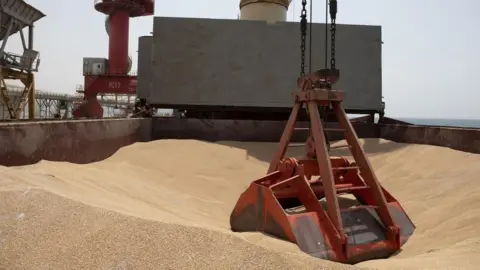Russia and Ukraine extend grain deal despite disagreement
 Reuters
ReutersA deal allowing Ukraine to export millions of tonnes of grain through the Black Sea despite the ongoing conflict with Russia has been extended.
But it is unclear how long it will last, with Ukraine pushing for 120 days, and Russia calling for 60 days.
Russia has warned it will not allow the deal to go on longer unless sanctions against Moscow are softened.
The UN and Turkey helped broker the export agreement last July following fears of a global food crisis.
Ukraine is one of the world's top producers of grain, but its access to ports in the Black Sea was blocked by Russian warships following the invasion in February last year.
Countries that suffer with food insecurity, such as Yemen, rely heavily on these supplies.
Turkish President Recep Tayyip Erdogan announced an agreement on extending the deal on Saturday, with hours to go before it was due to expire.
"This deal is of vital importance for the global food supply. I thank Russia and Ukraine, who didn't spare their efforts for a new extension, as well as the United Nations secretary general," he said.
But neither Mr Erdogan nor the UN clarified how long it would last. Ukraine wanted it to be extended for 120 days, but Russia said it was only willing to renew the pact for another 60 days.
Vassily Nebenzia, Russia's ambassador to the UN, said on Friday that the EU, UK and US had two months to remove any sanctions targeting Russia's agricultural sector if they wanted the deal to continue.
Moscow wants Russian producers to be able to export more food and fertiliser to the rest of the world, but says Western sanctions are preventing them.
While food and fertiliser exports have not been targeted, Russia says restrictions on payments, insurers and shippers makes exports difficult.
Russia briefly withdrew from the deal in November last year, accusing Ukraine of attacking its fleet in the Crimea - but it re-joined a few days later.
According to the UN, the deal has already allowed nearly 25 million tonnes of foodstuffs from Ukraine's Black Sea ports reach global markets.
